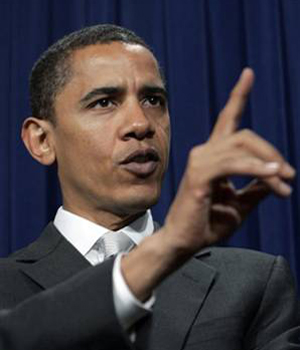Energy: In some ways, Obama is like a bad-luck version of Capt. Kirk. He at least seems to know that we have to get out from under imported oil, and, like the engineers on the Enterprise, he even seems to grasp the scientific strides needed to change our energy future. Unfortunately though, he doesn't have Gene Roddenberry picking his scripts. We will probably not be able to get cheap, clean fuel through any convenient means like reversing polarity, and unfortunately Obama may therefore end up in the uncomfortable position of asking his crew-mates for sacrifice without reward.
Education: 1) Science and math are great, but the very communal nature of both of these things may result in our pissing away any advantages. Scientists talk to scientists all over the world, so very few scientific secrets are going to stay all that damn secret. 2) According to The Law of Comparative Advantage in economics, a person, company or nation best serve both their own needs and those of the world by pursuing their own best talent, even in the face of superior talents. Given this, we may not want to try to build an economy on science and math--they may not, in fact still be out strongest suits, and more science and math education may limit us to only certain high-tech' markets. 3) How 'bout teaching our kids a foreign language, too? We live in a multi-ligual market and a bi-lingual country, after all.
An End to Tax Breaks for the Rich: Tax ease for the rich is not the same as tax ease for business. At any given time a given company has only an ungrowing fund of about two-weeks worth of its net income available to spend for anything unplanned. After establishing this fund, a business seems to be spending its entire income on payroll, expenses, taxes or pre-planned improvements, and each of these expenditures generates taxes, whether through the income taxes of wage earners and the sales tax on purchases as well as through any further companies receiving that money from the original source. People, however, neither spend nor save all of their money, and so, oddly, they generate fewer taxes, per-dollar, than even tax-free companies of equal income would through the taxes of its employees. In light of this fact then, a tax on the rich does not seem to be a greater burden on the economy than a tax on the middle- or lower-classes, and in light of this, an even tax certainly makes sense. Unfortunately, taxes will probably never be even. The rich will have more ways to invest and disqualify income simply by having more and better advisers, and lawmakers will have to be in a continuous search for means to overcome any tax loop-holes in use. I wish the President good luck in his stated attempt, but I also would like to suggest widening the number of investments exempt from tax to include any money banked for over a year. Banks lend dollars recorded to their funds for the ultimate deposit of at least a percentage of those dollars into the accounts of those receiving the funds. Those recipient banks then record those same dollars to their accounts, and through this hopefully benign fiction, the sum total amount of capital available for investment grows, and probably faster than through any percolation from the top.
Just a few thoughts.....

2 comments:
Interesting take John though there is many a slip 'tween a cup and a lip. (between the r & the t key too- see out, read our)
To leave OUR economic future in the hands of banks to lend or not to lend is dangerous. Unless Barry is lumping foreign aid in with domestic spending, he missed a great opportunity to win back a portion of his lost populous with severe cuts in this area. The trick is to bring all spending into line with a sustainable limit. I like the idea of limiting the budget to a percentage of GDP, simple and effective. All of the terms that he spins like investment are smoke and mirrors for spending. Did you see the program for the recent state dinner with China? The waste in Washington is a great place to start but merely window dressing. Let's cut state dept. funds by 75% and we will start to see some results.
I'm not claiming that banks should be free to lend to anyone. If they could, they'd just re-enter the normally lucrative sub-prime market. I'm only asserting that banking does grow the amount of capital available for investment. Likewise, while I do agree with you on the need to cut the size and cost of government, I also think that any single, unspecified reduction will leave the fools on The Hill likely to judge the worth of a program in terms of their re-election rather than its service to the citizenry. As opposed to paying the entire GOVERNMENT a set fraction of the GDP though, how 'bout paying a fixed part of that figure, perhaps a billionth, to Congress and the President? Waste-hunts have proved, at best, temporary, as our government simply spends and grows too fast for even the most sweeping cuts to have a lasting effect. Putting politicos "on commission" would, however, genuinely motivate them to foster the economy.
Post a Comment